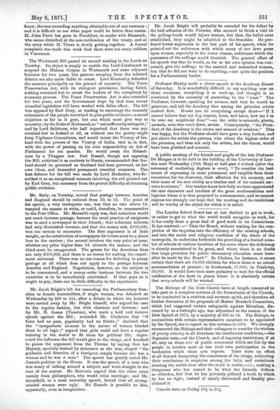The Westmeath Bill passed its second reading in the Lords
on Tuesday. Its object is simply to enable the Lord-Lieutenant to suspend the Habeas Corpus in Westmeath and some adjacent baronies for two years, but persons escaping from the infected district are also made liable to arrest. Lord Kimberley defended the measure principally on the ground of necessity. The Peace Preservation Act, with its stringent provisions, having failed, nothing remained but to arrest the leaders of the conspiracy by summary process. The Peace Preservation Act is also extended for two years, and the Government hope by that time recent remedial legislation will have worked with fuller effect. The bill was opposed by Earl Grey, as tending to encourage the unmanly reluctance of the people terrorized to give public evidence—a sound objection as far as it goes, but one which must give way to necessity; by the Duke of Richmond, as "not sufficiently stringent ;" and by Lord Salisbury, who half regretted that there was any .criminal law in Ireland at all, as without one the gentry might iorm Vigilance Committees, and would invest the Viceroy of Ire- land with the powers of the Viceroy of India, that is, in fact, with the power of passing on his own responsibility an Act of Parliament for six months. He would crush the Riband- men by a Thuggee law. Earl Russell, though not opposing the Bill, criticized it as contrary to liberty, recommended that Ire- land should be governed as Scotland had been governed, on her -own ideas, and demanded permanent remedial measures. The best defence for the bill was made by Lord Hatherley, who de- scribed it as an exceptional measure involving the evil pointed out by Earl Grey, but necessary from the proved difficulty of obtaining public evidence.
































 Previous page
Previous page